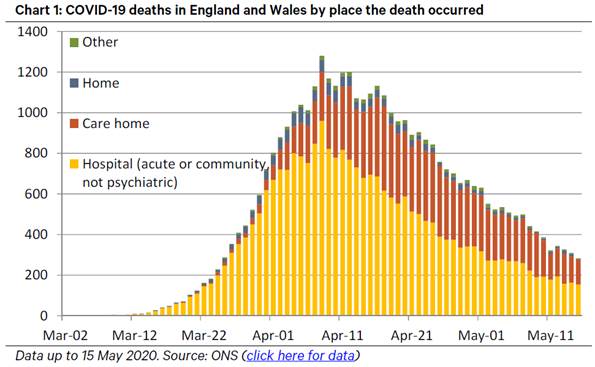Click here for full report and disclosures
â Moving to Âgphase twoâ: With virus trends improving, the UK will begin on 1 June to gradually lift the lockdown, which was originally introduced on 23 March. The UK government plans to reopen society and restart economic activity in stages, while adhering to some continued social-distancing practices to prevent a second wave of the virus that would require a return to full nationwide lockdown. The UK will remain in âphase twoâ until a medical solution becomes available, such as vaccine or effective treatment. At that point, life can begin to fully return to normal in âphase threeâ.
â Massive costs: The damage from the COVID-19 pandemic is far reaching. It extends well beyond the high number of direct deaths and permanent health damage from the disease. The lockdown is leading to major negative health, social and economic consequences. As the costs of the lockdown and recession rise, the economyâs ability to serve the long-term needs of society diminishes while the risks increase.
â Policy failures: The UK arguably could have suffered fewer deaths and less economic damage if it had reacted with suitably aggressive measures to contain the pandemic at an earlier stage. Data on COVID-19 deaths for England by age group suggest that the lockdown provided too little protection for the old and vulnerable who account for the vast majority of deaths. Looking forward, the UK should tailor its measures better to protect those most at risk.
â Paying the price: Having reacted late to the first wave of the virus – and in the wake of a huge public outcry at the rising death toll – the UK was forced to introduce a severe lockdown to contain its spread. As case numbers are still rising faster than on the continent, the UK is now easing its lockdown later than major parts of Europe. This raises the already high economic and social costs and further damages the UKâs already weakened international reputation that was badly hurt by Brexit.
â A better plan would involve a broader assessment of the costs of lockdowns and social distancing with a risk-based approach to reopening the economy that provides support to those that need it most. To minimise the economic and social costs, the easing of the lockdown should focus on those groups facing the least risk – the young and healthy. That may even enable the government to lift restrictions earlier on low-risk activities while maintaining them for potential super-spreading events and risks. A further increase in testing would help. In case of a major second wave, which we do not expect, the lockdown should be re-introduced on an age and risk basis, with more aggressive steps to protect the vulnerable and fewer restrictions on the healthy than in the first wave. The government should emphasise that it will not return to the harsh nationwide lockdown unless the pandemic were to worsen a lot.
Senior Economist
+44 20 3465 2672
kallum.pickering@berenberg.com
Disclosures
This material is intended as commentary on political, economic or market conditions for institutional investors or market professionals only and does not constitute a financial analysis or a research report as defined by applicable regulation. See the "Disclaimers" section of this report.
The commentary included herein was produced by Joh. Berenberg, Gossler & Co. KG (Berenberg). For sales inquiries, please contact:
Phone: +44 (0)20 3207 7800
Email: berenberg.economics@berenberg.com
BERENBERG
Joh. Berenberg, Gossler & Co. KG
Neuer Jungfernstieg 20
20354 Hamburg
Germany
Registered Office: Hamburg, Germany
Local Court Hamburg HRA 42659
